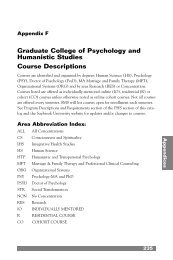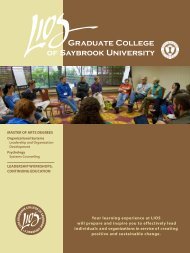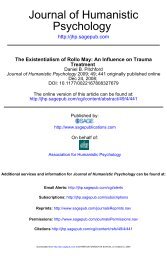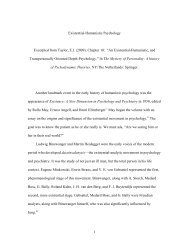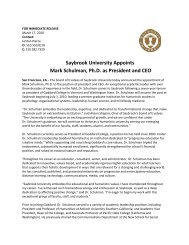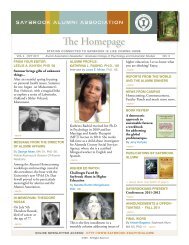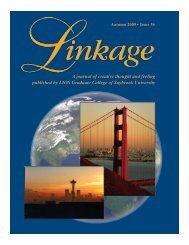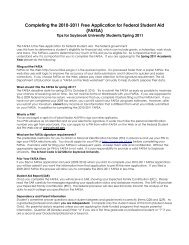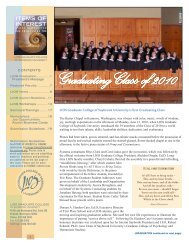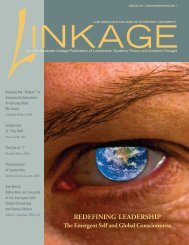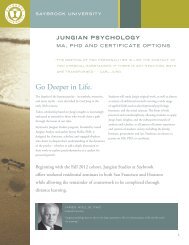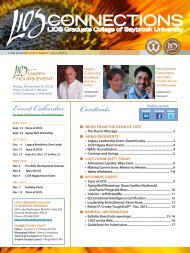Mar 2011: Connections - Saybrook University
Mar 2011: Connections - Saybrook University
Mar 2011: Connections - Saybrook University
Create successful ePaper yourself
Turn your PDF publications into a flip-book with our unique Google optimized e-Paper software.
19<br />
Author<br />
Adam Kahane<br />
(LIOS ‘98)<br />
Power and love:<br />
A theory and<br />
practice of social<br />
change<br />
A book review by Lorelette Knowles, MA, MSLIS<br />
Our most intractable group, community and societal challenges<br />
are highly complex because our world is so full–of people,<br />
cultures, ideas, pollution, etc. These problems are complex<br />
dynamically (solutions require systems thinking), socially<br />
(solutions require the active engagement of the participants),<br />
and generatively (solutions require new “next practice”<br />
solutions), and when people try to solve them, best-selling<br />
author, consultant and LIOS graduate Adam Kahane argues that<br />
they tend to respond in one of two ways. They either struggle<br />
to save themselves and to get what they want by dominating<br />
others regardless of costs (e.g., by waging war as an extreme<br />
case), or they ignore problems and try to avoid conflict.<br />
These apparently contradictory approaches reflect two separate,<br />
fundamental drives: power, which theologian and philosopher<br />
Paul Tillich defines as “the drive of everything living to realize<br />
itself, with increasing intensity and extensity,” and love, which<br />
Tillich calls “the drive towards the unity of the separated.” Both<br />
of these drives are inextricably part of being human, “delineate<br />
the space of social change,” according to Kahane (p. 9), and have<br />
a generative and a degenerative side: love “pulls” and makes<br />
power generative, and power “pushes” and makes love generative.<br />
As Dr. <strong>Mar</strong>tin Luther King, Jr., observed, “Power without love<br />
is reckless and abusive, and love without power is sentimental<br />
and anemic.” Therefore, in order to achieve sustainable, systemic<br />
change, a person must realize that, in a “full world” of complex<br />
challenges, one must be able to understand the interrelatedness<br />
of, and choose to work creatively and fluidly with, both power<br />
and love. In this book, Kahane explores how, through over 20<br />
years of varied experiences in some 50 countries, he learned<br />
how to do this, first falling, then stumbling, then walking, then<br />
stepping forward.<br />
This brief, highly engaging and clearly written narrative has<br />
earned enthusiastic praise from many sources for its timeliness,<br />
wisdom and insights, all based on the author’s personal experience<br />
and learning. It should be of great value to consultants,<br />
teachers and students, leaders in the private, public and social<br />
sectors, change agents of all kinds, and anyone who is interested<br />
in solving problems and making a positive difference using<br />
power combined with love.<br />
Organizer, designer and facilitator Kahane is a partner in the<br />
Cambridge, Massachusetts, office of Reos Partners (www.<br />
reospartners.com), an international organization dedicated to<br />
taking innovative collective action in complex social systems.<br />
He is a member of the World Academy of Art and Science, the<br />
Commission on Globalisation, the Aspen Institute’s Business<br />
Leaders’ Dialogue, the Society for Organizational Learning, the<br />
Global Leadership Network, and the Global Business Network.<br />
He is also an Associate Fellow of the Institute for Science, Innovation<br />
and Society at the <strong>University</strong> of Oxford’s Said Business<br />
School, and, as a “country changer” working for social justice,<br />
he was one of the 16 exceptional people featured in Fast Company’s<br />
1999 “Who’s Fast”<br />
(http://www.fastcompany.com/magazine/20/whosfast.html).<br />
Kahane is the author of the 2007 book, Solving Tough Problems:<br />
An Open Way of Talking, Listening, and Creating New Realities (with<br />
a foreword by Peter Senge, 2nd edition, Berrett-Koehler, ISBN-<br />
10:1576754642, ISBN-13:978-1576754641; both are available in<br />
the LIOS Library). He holds a BSc in physics (first class honors)<br />
from McGill <strong>University</strong> in Montreal, an MA in energy and resource<br />
economics from the <strong>University</strong> of California at Berkeley, and an<br />
MA in applied behavioral science from LIOS.<br />
Adam Kahane can be reached at kahane@reospartners.com, and<br />
both of his books can be browsed using Amazon.com’s “Look<br />
Inside” function.<br />
Reference<br />
Kahane, A. (2010). Power and love: A theory and practice of social<br />
change. San Francisco, CA: Berrett-Koehler. Drawings<br />
by Jeff Barnum. Paperback: 172 pages, including notes,<br />
bibliography, and index. ISBN-10: 1605093041; ISBN-13:<br />
978-1605093048



